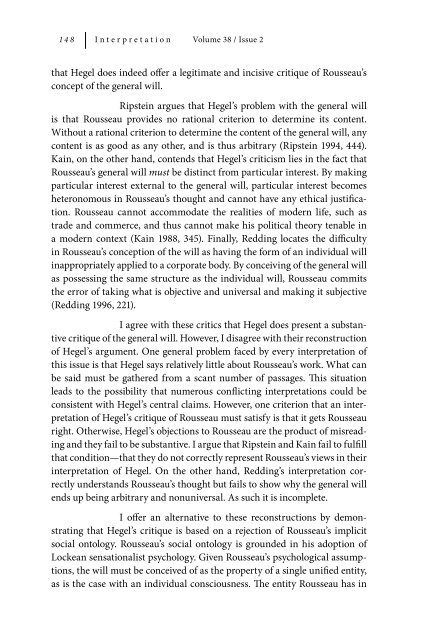105 119 147 171 177 197 - Interpretation: A Journal of Political ...
105 119 147 171 177 197 - Interpretation: A Journal of Political ...
105 119 147 171 177 197 - Interpretation: A Journal of Political ...
Create successful ePaper yourself
Turn your PDF publications into a flip-book with our unique Google optimized e-Paper software.
1 4 8 I n t e r p r e t a t i o n Volume 38 / Issue 2<br />
that Hegel does indeed <strong>of</strong>fer a legitimate and incisive critique <strong>of</strong> Rousseau’s<br />
concept <strong>of</strong> the general will.<br />
Ripstein argues that Hegel’s problem with the general will<br />
is that Rousseau provides no rational criterion to determine its content.<br />
Without a rational criterion to determine the content <strong>of</strong> the general will, any<br />
content is as good as any other, and is thus arbitrary (Ripstein 1994, 444).<br />
Kain, on the other hand, contends that Hegel’s criticism lies in the fact that<br />
Rousseau’s general will must be distinct from particular interest. By making<br />
particular interest external to the general will, particular interest becomes<br />
heteronomous in Rousseau’s thought and cannot have any ethical justification.<br />
Rousseau cannot accommodate the realities <strong>of</strong> modern life, such as<br />
trade and commerce, and thus cannot make his political theory tenable in<br />
a modern context (Kain 1988, 345). Finally, Redding locates the difficulty<br />
in Rousseau’s conception <strong>of</strong> the will as having the form <strong>of</strong> an individual will<br />
inappropriately applied to a corporate body. By conceiving <strong>of</strong> the general will<br />
as possessing the same structure as the individual will, Rousseau commits<br />
the error <strong>of</strong> taking what is objective and universal and making it subjective<br />
(Redding 1996, 221).<br />
I agree with these critics that Hegel does present a substantive<br />
critique <strong>of</strong> the general will. However, I disagree with their reconstruction<br />
<strong>of</strong> Hegel’s argument. One general problem faced by every interpretation <strong>of</strong><br />
this issue is that Hegel says relatively little about Rousseau’s work. What can<br />
be said must be gathered from a scant number <strong>of</strong> passages. This situation<br />
leads to the possibility that numerous conflicting interpretations could be<br />
consistent with Hegel’s central claims. However, one criterion that an interpretation<br />
<strong>of</strong> Hegel’s critique <strong>of</strong> Rousseau must satisfy is that it gets Rousseau<br />
right. Otherwise, Hegel’s objections to Rousseau are the product <strong>of</strong> misreading<br />
and they fail to be substantive. I argue that Ripstein and Kain fail to fulfill<br />
that condition—that they do not correctly represent Rousseau’s views in their<br />
interpretation <strong>of</strong> Hegel. On the other hand, Redding’s interpretation correctly<br />
understands Rousseau’s thought but fails to show why the general will<br />
ends up being arbitrary and nonuniversal. As such it is incomplete.<br />
I <strong>of</strong>fer an alternative to these reconstructions by demonstrating<br />
that Hegel’s critique is based on a rejection <strong>of</strong> Rousseau’s implicit<br />
social ontology. Rousseau’s social ontology is grounded in his adoption <strong>of</strong><br />
Lockean sensationalist psychology. Given Rousseau’s psychological assumptions,<br />
the will must be conceived <strong>of</strong> as the property <strong>of</strong> a single unified entity,<br />
as is the case with an individual consciousness. The entity Rousseau has in
















